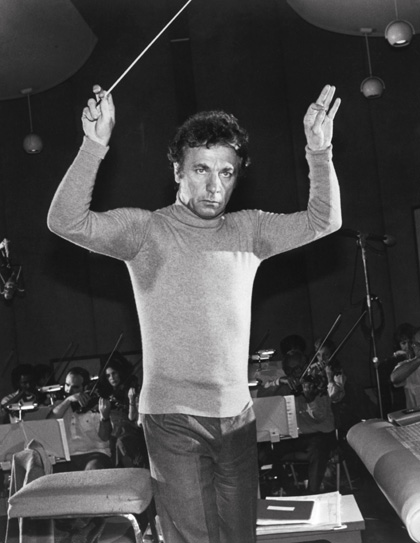Maurice Jarre, composer

The Kobal Collection
b. 13/9/1924; d. 28/3/2009
Maurice-Alexis Jarre, best known for his sweeping orchestral scores for David Lean epics, left behind six decades worth of extraordinary and varied film compositions.
Born in Lyon in 1924, Jarre trained at the Sorbonne and then at the Conservatoire de Paris. By 1951 he was a dedicated and talented percussionist, and a full-time composer for the Theatre National Populaire.
A chance after-show meeting with Georges Franju brought Jarre his first film commission, writing the score for Franju’s short documentary Hôtel des Invalides in 1952. It marked the first of several successful collaborations between the two men.
Jarre would and could experiment wildly, not just with composition but with orchestral techniques, and he brought almost concrète styles of music-making into his work; he’d detune instruments, dismantle pianos or make boxes for bells, all to create bizarre musical accompaniments for Franju’s images. Their relationship arguably peaked with 1959’s Les Yeux sans visage (Eyes Without a Face), for which Jarre created nightmarish carousels and a desperate, unforgettable theme to match Franju’s disturbing vision.
Two years later Jarre worked outside of France for the first time – straight in at the deep end with Lean and Lawrence Of Arabia. His expansive, unusual and majestic score won him his first Oscar, and it became clear that Jarre had a remarkable knack of defining the sound of his films quickly and economically, whether they were set in Siberia, on a Grand Prix circuit or teetering on the stormy coast of Ireland. His second Oscar came in 1965 with his original music for Doctor Zhivago, a score that gave the world ‘Lara’s Theme’. This simple, romantic ten-note melody, written for Julie Christie, became an easy-listening standard, and was covered for decades by singers, sitar players and budget orchestras across the globe. Jarre’s career continued at pace and his music always remained surprising, percussive, unusual and instrumentally diverse. His third Oscar came with Lean’s A Passage to India, with Jarre as usual revelling in the chance to bring exotic instrumentation into his work.
As musical styles changed towards to the end of the 1970s, Jarre was happy to experiment with more modern styles and new instruments; many of his later scores brought together electronics and traditional sounds to great effect. His son Jean-Michel Jarre is also a well-known electronic pioneer.
Over the 150 or so films he scored, Jarre won fans, awards and admirers the world over. And as well as his collaborations with Lean, he worked with some of cinema’s greatest directors, including Hitchcock, John Huston, Peter Weir, William Wyler and Franco Zefferelli.
Johnny Trunk
